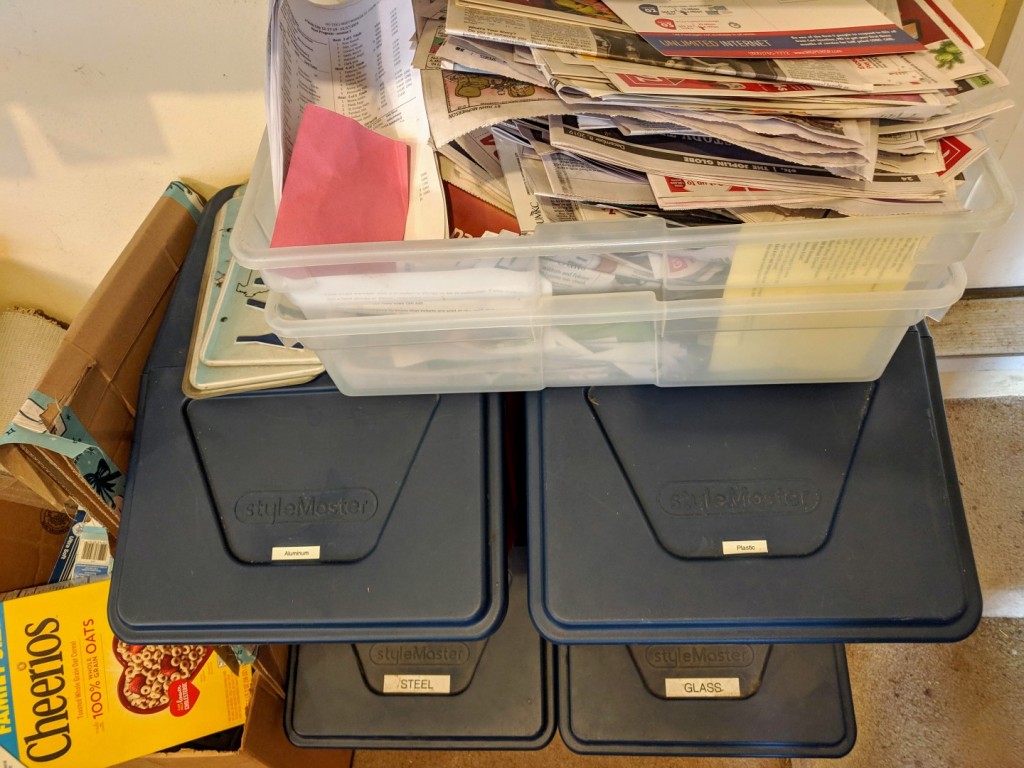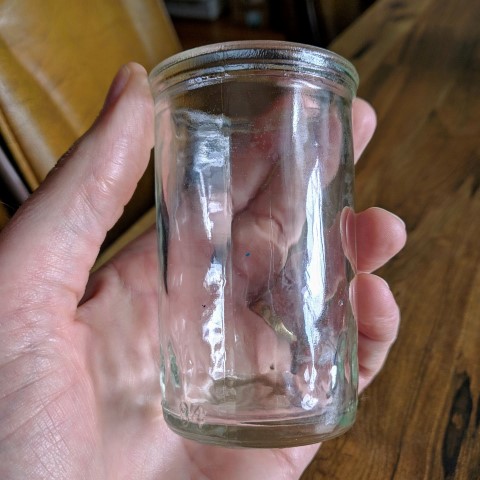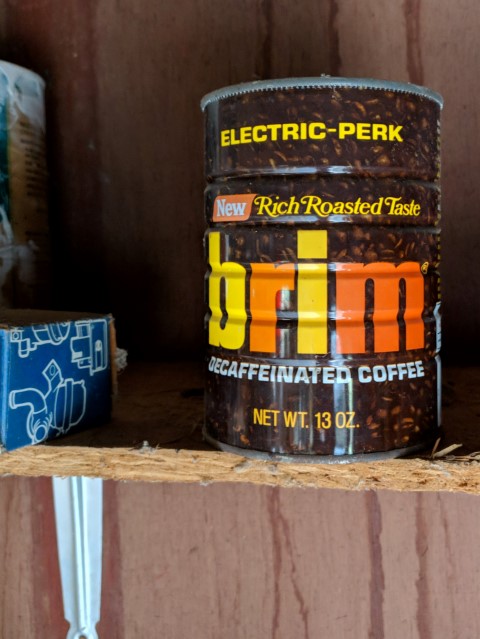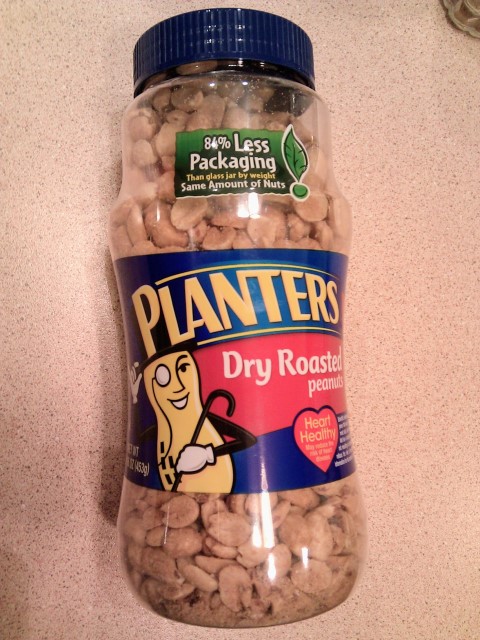
As a kid, my family didn’t participate in recycling. I didn’t know anyone who did. In fact, I don’t think I had even heard the word recycling. But everyone reused stuff. Just give a quick internet image search on the term “jelly jar juice glasses.” People sell these as antiques, now.

Stores didn’t sell 2-liter plastic bottles of soda, or 20-ounce bottles, or any plastic bottles. I remember being able to buy Coca-Cola in 6-packs of 10-ounce or 12-ounce glass bottles, or even in 32-ounce glass bottles. These were returnable to the store for a nickel each, and kids like me would pick up bottles or ask adults for their bottles so that we could return them and get a little bit of money to buy a candy bar or pack of gum.
I didn’t live in the era of the home-delivery milkman, but I do recall when we could buy milk in quart or even gallon-sized glass bottles — even at the local convenience store / gas station — and return the bottles for sanitizing and refilling. Juice came in glass bottles, or metal cans, or as frozen concentrate in cardboard cans. (Remember the insider trading on “FCOJ” in 1983’s Trading Places?)

Empty coffee cans became storage containers, like this one I saw recently in my dad’s garage. When margarine in a tub started to become the norm, families like mine saved the tubs and lids and reused them. I still have some of my surplus Christmas lights (saved to repair old strands for the tree) stored in old margarine tubs. Some people took this to extremes — saving hundreds of baby food jars in the garage to hold nails and screws, or collecting mountains of smelly dog food cans in the barn (a story about my father-in-law that I only heard about) to use for who-knows-what. What packages do you remember your parents or grandparents reusing?
But since recycling wasn’t “a thing,” we still threw lots of things into the garbage that, today, I’d be recycling. Steel cans that had contained soup, Hershey’s syrup, Hi-C “Grape Drink,” or La Choy Chow Mein (blech!). Cardboard cereal boxes. Glass mayonnaise jars, ketchup bottles, or later, Ragu spaghetti sauce jars.

Today, more and more of these items are available mainly, or even exclusively, in plastic. Sometimes this is beneficial for freshness or safety, such my box of Grape Nuts that now has a plastic bag inside. But typically, is is simply for convenience, or to reduce the cost of production and transport. In 2011, Planter’s Dry Roasted Peanuts switched from glass to plastic packaging. They even added a green leaf image to try to imply that their “84% less packaging” was eco-friendly. And they didn’t even add a recycling code to the container. That was the last time I bought any.
I’m here to announce my new-year’s resolution. In 2020, I pledge to use zero — or as close to zero as possible — single-use plastic items or packaging. This means no water or soda in plastic bottles, no disposable plastic or styrofoam cups at fast-food restaurants or convenience stores, no plastic straws (except those I’ve saved and reused). I don’t plan to entirely give up some things, such as margarine, but wherever possible, I will choose a sustainable alternative. And I’ll write a blog post every week in 2020 to chronicle my experiment. Along the way, I will explore some facts and myths about recycling.
I hope mostly to tell a story about my experiment. I do not claim that one person avoiding single-use plastic will change the world. And I do not plan to avoid all disposable packaging. I will choose paper, glass, or metal options when possible — resources that are all (as I will flesh out) more renewable or sustainable than plastic. Mostly, I hope to show what is and is not possible to accomplish as I embark upon this journey, and perhaps inspire someone else to attempt their own journey towards sustainability.
Already, I know that it is only because of privilege that I am even able to begin this experiment. Much like those who attempt to live a vegan lifestyle, it is more easily accomplished when one has the monetary resources to make choices that aren’t the cheapest option. I understand this. I can afford to spend extra on a product that comes in sustainable packaging, and I know that others cannot. While I plan to make sacrifices, it is not my intention to imply that these sacrifices compare to the tremendous sacrifices made by others who serve their country in the military to keep it safe, or who leave their country and become refugees because it is unsafe. Nor do I intend my choices in any way to make me out to be a better person than someone who cannot or does not wish to make similar choices. I simply wish to highlight some of the consequences of our choices as a society, and as individuals, and hopefully point out some places where our choices can make a difference.
Next week, I will explore the recycling of plastic — what is possible, what is practical, and what is actually happening. I’ll share what I know (as an organic chemist) and I’ll do some research so that I can accurately report on some of the things I don’t know. I’ll compare plastic recycling to the recycling of other materials, such as metal and glass. Then, each week, I hope to tell a bit more of my story.
Wish me luck on my journey.
Good luck!!! I’m working on the same goal. I’m looking forward to your blog posts!
LikeLiked by 1 person
I started a similar goal last year by recycling certain items at a recycling center – which on most occasions is not convenient but necessary because of my concerns about our environment. I Iook forward to following your story and what you find in your research.
LikeLiked by 1 person
I suppose it wouldn’t surprise you that my mom started the first community recycling program in Missouri– in Moberly. I look forward to your journey in words!
LikeLiked by 1 person
Starting January 1 we can no longer recycle glass in Norman or Edmond, which is infuriating. We need to find ways for more local or regional entrepreneurs to create recycling options. Our planet does not need more mining for raw materials just because there is supposedly no profit in recycling today.
LikeLike
No glass recycling? 😥 I don’t get it. Glass is my go-to replacement for plastic.
LikeLike
Me, too. Here’s an article from C&EN about the problems with recycling glass in the US. As they say, “it’s complicated”. https://cen.acs.org/materials/inorganic-chemistry/glass-recycling-US-broken/97/i6 (Feb 11, 2019).
LikeLike
Welcome to the journey my friend. It’s a great goal and something you will look back and be proud of.
LikeLike
Thank you for sharing. Here is an interesting NPR story on the plastics industry that is behind the Keep America Beautiful organization. Remember the “Crying Indian” of the 1970s TV ads? Interesting backstory… https://www.npr.org/2019/09/04/757539617/the-litter-myth
LikeLike
Thanks for the link. I shouldn’t be surprised, but I didn’t know the backstory of this.
LikeLike